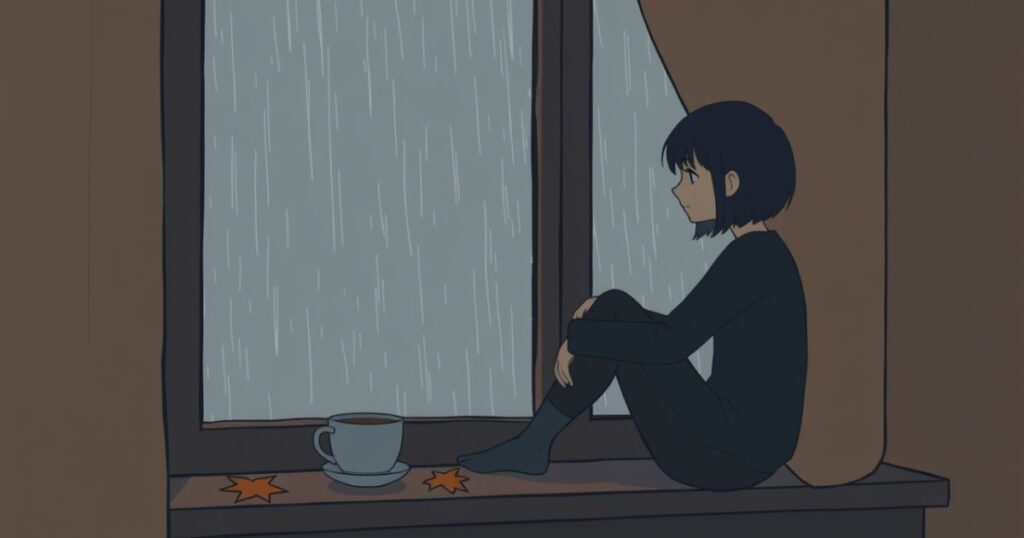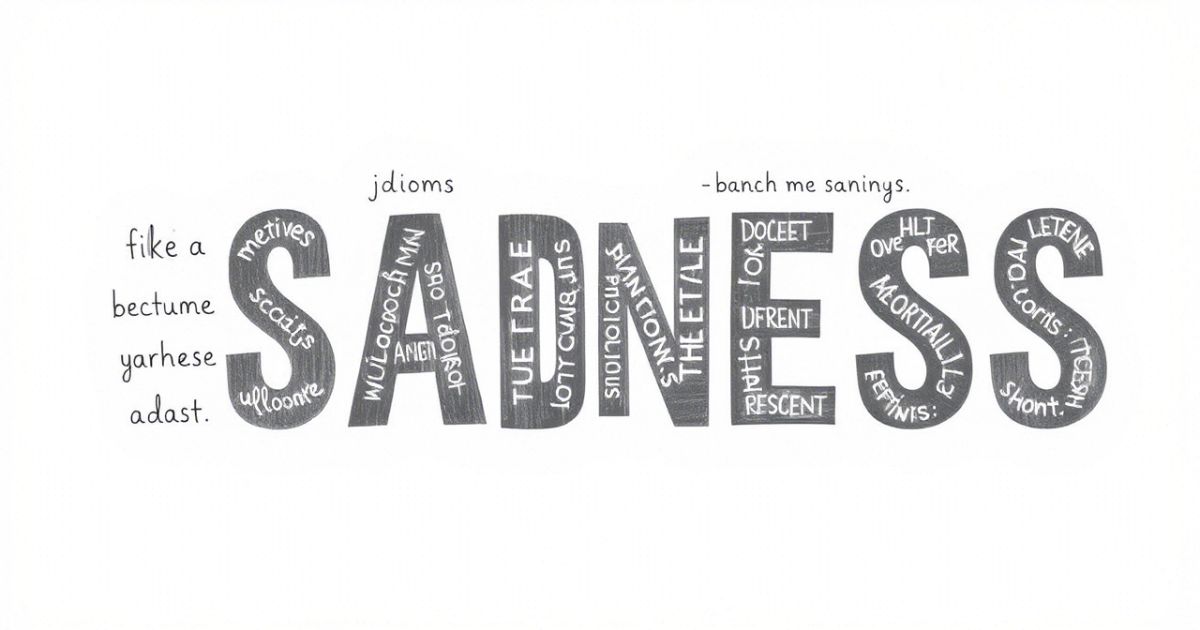Idioms for Sadness help us express emotions in a more colorful and relatable way. Instead of simply saying “I’m sad,” you can use sad idioms like “feeling blue” or “down in the dumps.” These idioms for sadness add depth to conversations and writing, making emotions more vivid. Whether you’re talking about a bad day or a heartbreaking moment, using an idiom for sad feelings makes your words more impactful. If you’re looking for 5 idioms on sadness, phrases like “have the blues” and “wear one’s heart on one’s sleeve” can help express deep emotions.
Understanding different idioms for sadness can improve your communication skills. These idioms for sad moments make storytelling and conversations more engaging. Learning just 5 idioms on sadness can help you sound more natural and expressive. So, next time you feel down, try using a sad idiom to describe your emotions more effectively.
Idioms for Sadness

Idioms for Sadness express emotions like disappointment, grief, or melancholy in a figurative way. Using these phrases, such as “feeling blue” or “down in the dumps,” helps convey deep emotions in everyday conversations.
1. Feeling blue
Meaning: To feel sad or melancholic.
In a Sentence: Ever since Jake lost his job, he’s been feeling blue.
Other Ways to Say: Feeling down, Feeling low, In the dumps.
2. Down in the dumps
Meaning: Feeling very sad or discouraged.
In a Sentence: After failing his exam, Ryan was down in the dumps all week.
Other Ways to Say: Feeling miserable, In a funk, Depressed.
3. Cry over spilled milk
Meaning: To be upset over something that cannot be changed.
In a Sentence: There’s no use crying over spilled milk, just learn from the mistake and move on.
Other Ways to Say: Dwell on the past, Be upset over nothing, Regret unnecessarily.
4. Have a heavy heart
Meaning: To feel deep sadness or sorrow.
In a Sentence: She had a heavy heart as she said goodbye to her childhood home.
Other Ways to Say: Feel sorrowful, Be grief-stricken, Feel weighed down emotionally.
5. Wear one’s heart on one’s sleeve
Meaning: To openly show one’s emotions.
In a Sentence: Mark wears his heart on his sleeve, so it’s easy to tell when he’s upset.
Other Ways to Say: Be an open book, Show emotions freely, Be transparent with feelings.
6. Downhearted
Meaning: Feeling discouraged or sad.
In a Sentence: She felt downhearted after not getting the promotion she worked so hard for.
Other Ways to Say: Dejected, Gloomy, Crestfallen.
7. Have the blues
Meaning: To feel sad or melancholy.
In a Sentence: Ever since her best friend moved away, Lily has had the blues.
Other Ways to Say: Be down, Feel gloomy, Be in low spirits.
8. Heartbroken
Meaning: Deeply saddened, often due to love or loss.
In a Sentence: After their breakup, Jake was completely heartbroken.
Other Ways to Say: Devastated, Crushed, Brokenhearted.
9. Tearjerker
Meaning: Something that evokes deep sadness or strong emotions.
In a Sentence: That movie was a real tearjerker, I cried through the whole thing!
Other Ways to Say: Emotional story, Heart-wrenching, Gut-wrenching.
10. Feel under the weather
Meaning: To feel slightly ill or unwell.
In a Sentence: I think I’ll stay home today, I’m feeling a bit under the weather.
Other Ways to Say: Not feeling great, Feeling off, Slightly sick.
11. Long face
Meaning: A sad or disappointed expression.
In a Sentence: When she saw the test results, she had a long face all day.
Other Ways to Say: Gloomy look, Downcast expression, Frown.
12. In the doldrums
Meaning: Feeling depressed, dull, or lacking motivation.
In a Sentence: After the holidays, many people find themselves in the doldrums.
Other Ways to Say: Feeling sluggish, In a slump, Unmotivated.
13. Kick oneself
Meaning: To feel regret or remorse about something.
In a Sentence: I could’ve gotten the job if I had prepared better, I’m really kicking myself.
Other Ways to Say: Beat oneself up, Regret deeply, Feel remorseful.
14. Green around the gills
Meaning: Looking sick or unwell.
In a Sentence: After the roller coaster ride, Jake looked green around the gills.
Other Ways to Say: Looking pale, Feeling nauseous, Unwell.
15. Shed tears
Meaning: To cry or weep.
In a Sentence: She shed tears of joy when she reunited with her childhood friend.
Other Ways to Say: Cry, Weep, Get emotional.
16. Lump in one’s throat
Meaning: A feeling of emotional distress or sadness that makes it hard to speak.
In a Sentence: As he gave his farewell speech, he felt a lump in his throat.
Other Ways to Say: Choked up, Speechless with emotion, Overcome with feeling.
17. Hit rock bottom
Meaning: To reach the lowest point emotionally or in life circumstances.
In a Sentence: After losing his job and apartment, he felt like he had hit rock bottom.
Other Ways to Say: Reach the lowest point, At one’s worst, No way but up.
18. Feeling out of sorts
Meaning: Feeling unwell, unhappy, or slightly off.
In a Sentence: I don’t know what’s wrong today, I’m just feeling out of sorts.
Other Ways to Say: Not quite right, A little off, Unsettled.
19. Carrying the weight of the world on one’s shoulders
Meaning: Feeling overwhelmed by stress or responsibility.
In a Sentence: Ever since he became the sole provider, he’s been carrying the weight of the world on his shoulders.
Other Ways to Say: Overburdened, Stressed out, Weighed down.
20. Sinking feeling
Meaning: A sudden sense of worry, fear, or disappointment.
In a Sentence: I had a sinking feeling when I realized I left my keys inside the car.
Other Ways to Say: Gut feeling of dread, Sense of impending trouble, Uneasy feeling.
Related Guide:
21. Have a meltdown
Meaning: To lose control emotionally, often by crying or panicking.
In a Sentence: She had a meltdown when she realized she had lost her wedding ring.
Other Ways to Say: Break down, Lose it, Fall apart.
22. Gloomy Gus
Meaning: A person who is constantly sad, pessimistic, or moody.
In a Sentence: Don’t be such a Gloomy Gus, things will get better soon!
Other Ways to Say: Negative Nancy, Debbie Downer, Pessimist.
23. Rain on someone’s parade
Meaning: To ruin someone’s happiness or plans.
In a Sentence: I hate to rain on your parade, but the event has been canceled due to bad weather.
Other Ways to Say: Burst someone’s bubble, Spoil the fun, Bring bad news.
24. In tears
Meaning: Crying or on the verge of crying.
In a Sentence: She was in tears after hearing the emotional speech at the wedding.
Other Ways to Say: Crying, Weeping, Choked up.
25. Have a blue day

Meaning: To have a sad or depressing day.
In a Sentence: I’ve been having a blue day, so I just want to stay in bed.
Other Ways to Say: Feeling low, Bad day, Feeling down.
26. Down and out
Meaning: Struggling emotionally or financially, feeling hopeless.
In a Sentence: He was down and out after losing his business, but he never gave up.
Other Ways to Say: In a rough spot, At rock bottom, Feeling defeated.
27. Wipe tears away
Meaning: To stop crying and regain composure.
In a Sentence: She wiped her tears away and put on a brave face for her kids.
Other Ways to Say: Dry one’s eyes, Pull oneself together, Stop crying.
28. Feeling the blues
Meaning: Experiencing sadness or melancholy.
In a Sentence: Ever since the holidays ended, I’ve been feeling the blues.
Other Ways to Say: Feeling down, In a funk, Gloomy mood.
29. Get the blues
Meaning: To start feeling sad or depressed.
In a Sentence: I always get the blues when it rains for too many days in a row.
Other Ways to Say: Feel down, Get sad, Become melancholic.
30. Downcast
Meaning: Feeling dejected or discouraged.
In a Sentence: His downcast expression showed how disappointed he was after the game.
Other Ways to Say: Crestfallen, Gloomy, Low-spirited.
31. Feel out of place
Meaning: To feel uncomfortable, awkward, or like you don’t belong.
In a Sentence: She felt out of place at the party where she didn’t know anyone.
Other Ways to Say: Uneasy, Uncomfortable, Not fitting in.
32. Heavy hearted
Meaning: Feeling deep sadness or sorrow.
In a Sentence: He was heavy-hearted as he packed his bags to leave his hometown.
Other Ways to Say: Heartbroken, Sorrowful, Grief-stricken.
33. Mope around
Meaning: To move around sadly or without energy due to sadness.
In a Sentence: He spent the whole weekend moping around after the breakup.
Other Ways to Say: Sulk, Be gloomy, Languish.
34. Feel low
Meaning: To feel emotionally down or depressed.
In a Sentence: I don’t know why, but I’ve been feeling low all day.
Other Ways to Say: Feel blue, Be in a slump, Down in the dumps.
35. Let down
Meaning: To feel disappointed or betrayed.
In a Sentence: She felt let down when her best friend forgot her birthday.
Other Ways to Say: Disappointed, Betrayed, Heartbroken.
36. Out of spirits
Meaning: Feeling sad, discouraged, or lacking enthusiasm.
In a Sentence: Ever since he lost his job, he has been out of spirits.
Other Ways to Say: Discouraged, Downhearted, In low spirits.
37. Bowed down with grief
Meaning: Overwhelmed with sadness or sorrow.
In a Sentence: She was bowed down with grief after the passing of her beloved grandmother.
Other Ways to Say: Overcome with sorrow, Deeply saddened, Crushed by grief.
38. Tear up
Meaning: To get emotional and almost start crying.
In a Sentence: He teared up while watching his daughter’s graduation speech.
Other Ways to Say: Get misty-eyed, Choke up, Become emotional.
39. Be in a funk
Meaning: To feel stuck in a low or sad mood for a while.
In a Sentence: I’ve been in a funk all week, but I’m trying to shake it off.
Other Ways to Say: Feeling off, In a rut, Mentally drained.
40. Feel drained

Meaning: To feel emotionally or physically exhausted.
In a Sentence: After dealing with all the stress at work, I just feel drained.
Other Ways to Say: Exhausted, Worn out, Emotionally spent.
Exercise to Practice
- After losing her childhood teddy bear, Emma was feeling ______________ for days.
- Ever since her best friend transferred schools, Mia has been ______________.
- When he saw the storm approaching on his wedding day, Alex had a ______________.
- After losing his wallet, Jake felt like he had hit ______________.
- When she heard the sad news, Ava had a ______________ in her throat.
- Watching the heartbreaking movie made Olivia ______________.
- After failing his driving test, Liam had a ______________.
- With all the pressure from work and family, Noah felt like he was carrying ______________ on his shoulders.
- As she watched her balloon float away, Lily was ______________.
- When the power went out during her favorite show, Emma was ______________.
Answer Choices:
- Feeling blue
- Heartbroken
- Sinking feeling
- Rock bottom
- Lump in one’s throat
- In tears
- Meltdown
- Weight of the world
- Down in the dumps
- Downhearted
FAQ’s
What are some phrases to describe feeling sad?
People often use Idioms for Sadness like feeling blue or down in the dumps to describe emotions in a more expressive way.
How can idioms make emotions more relatable?
Using Idioms for Sadness helps people connect because these phrases add depth to conversations, making it easier to express feelings in a vivid way.
Why do people use idioms instead of saying they are sad?
Many prefer Idioms for Sadness as they make emotions sound more poetic, relatable, and engaging in both casual conversations and storytelling.
Can idioms help in storytelling and writing?
Writers often use Idioms for Sadness to make their characters’ emotions feel more real, adding layers of meaning to their stories.
What are common idioms to express heartbreak?
Some well-known Idioms for Sadness include heartbroken, have a heavy heart, and hit rock bottom, all of which reflect deep emotional pain.
Conclusion
Idioms for Sadness make it easier to express emotions in a natural and relatable way. Instead of just saying “I’m sad,” using sad idioms like “feeling blue” or “downhearted” adds depth to your words. These idioms for sadness help in both spoken and written communication, making emotions more vivid. If you’re looking for 5 idioms on sadness, try using “in the doldrums” or “have a heavy heart.” Each idiom for sad feelings helps paint a clearer picture of emotions.
By learning idioms for sadness, you can improve your language skills and express feelings more effectively. Whether in daily conversations or storytelling, these sad idioms make your words more engaging. Memorizing 5 idioms on sadness ensures you’re always ready to describe emotions better. So, the next time you feel low, use an idiom for sad moments to make your thoughts more expressive.

Ronan Fox is an experienced administrator with five years of expertise in managing operations, streamlining workflows, and ensuring organizational efficiency. He excels in team coordination, process optimization, and problem-solving. His strong leadership and analytical skills drive productivity and success.








